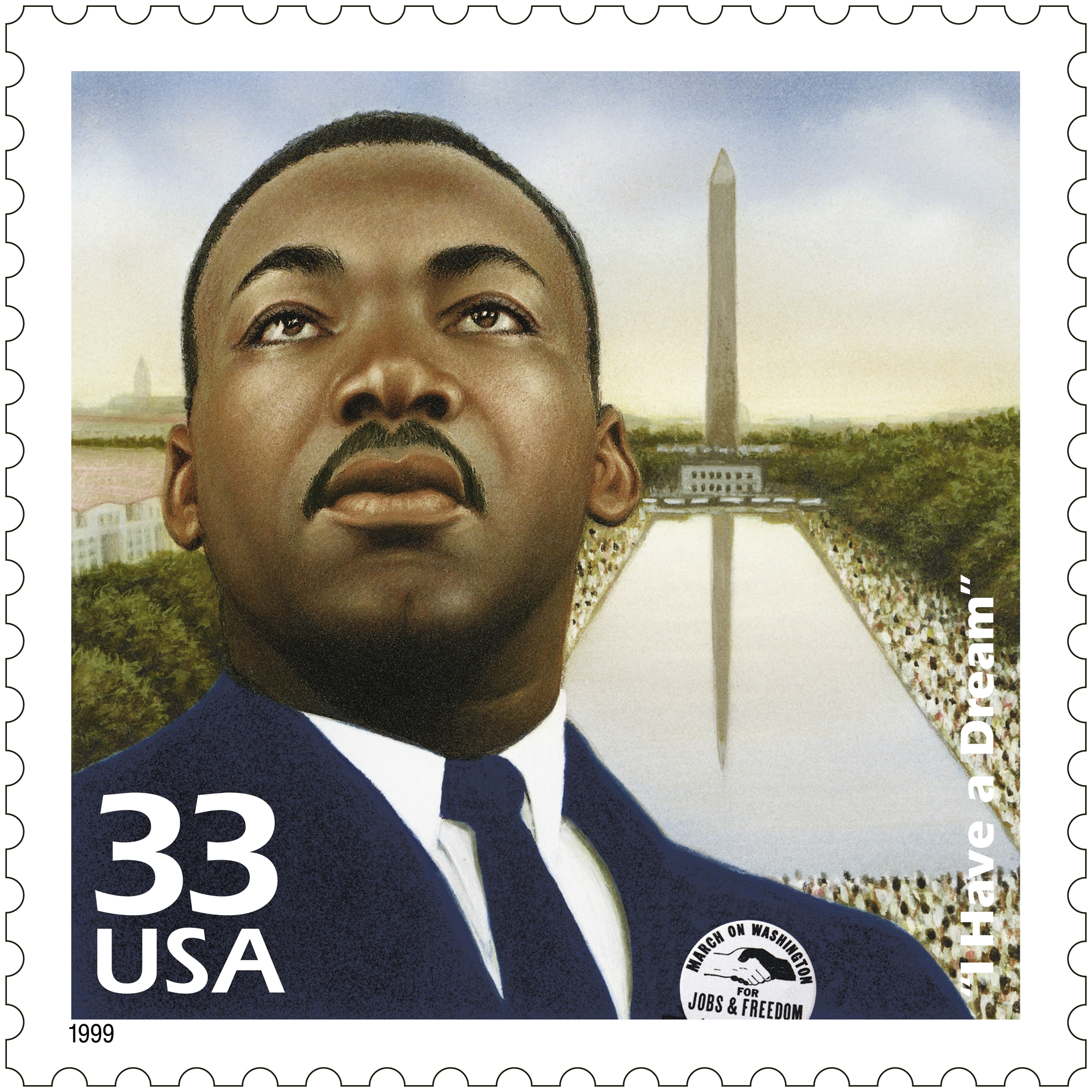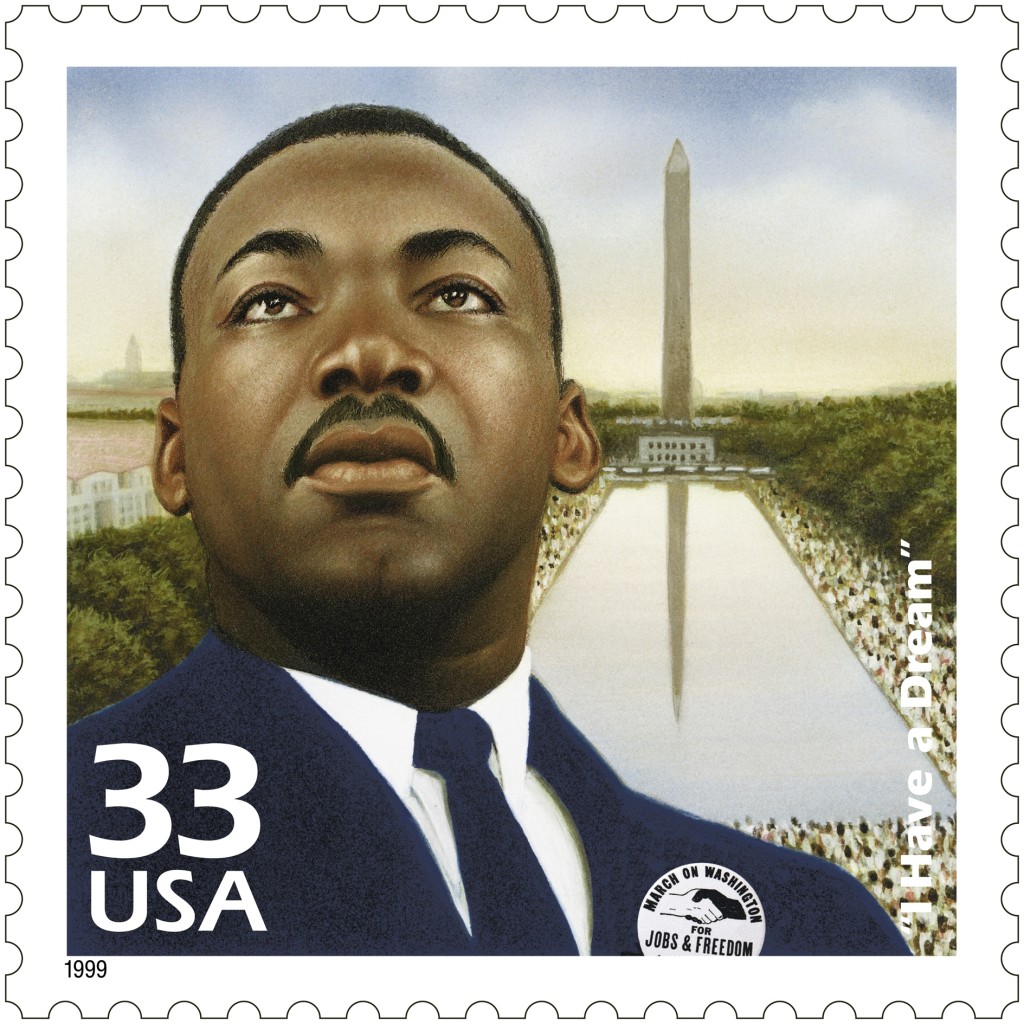
For more than a century, the U.S. Postal Service (USPS) stamps have paid homage to people who have left their mark on American history. Among those recognized are 100-plus African Americans whose contributions have helped shape America and the world. Here’s a list of the black leaders, inventors, educators, scientists, entrepreneurs, entertainers, athletes, and others who have been emblazoned on USPS stamps.
1940
Booker T. Washington
Booker T. Washington (1856–1915) was an educator, author, orator, and advisor to U.S Presidents Theodore Roosevelt and William Howard Taft. Though born into slavery, he established Alabama’s Tuskegee Normal and Industrial Institute (now Tuskegee University) because he believed that with education and self-help African Americans could lift themselves out of poverty and achieve success.
1948
George Washington Carver (appeared on stamps in 1948 and 1998)
George Washington Carver (1860–1943) was a botanist and inventor who improved the quality of life for millions of people through his scientific contributions in agriculture. His research—a great deal of which was conducted at Alabama’s venerable Tuskegee Institute (now Tuskegee University)—revolutionized the production of peanuts, sweet potatoes, and soybeans, which aided diet and nutrition and the hopes of raised poor farmers.
1967
Frederick Douglass (appeared on stamps in 1967 and 1995)
Abolitionist and statesman Frederick Douglass (1818–1895) astounded audiences with his arguments against slavery and for equal rights—especially since he had been born a slave. Douglass was America’s predominant African American abolitionist and agitator during the 19th century. He also was founder and editor of the “North Star” newspaper and a leading proponent of the antislavery movement.
1969
William Christopher (W.C.) Handy
Composer and musician W.C. Handy (1873–1958) is known as the “Father of the Blues.” One of America’s most influential songwriters, he felt that music from poor rural African Americans living in the Mississippi Delta was worth writing down and arranging in properly harmonized versions. Among his biggest hits: “Memphis Blues,” “Beale Street Blues,” and “St. Louis Blues.”
1973
Henry O. Tanner
Henry O. Tanner (1859–1937) was the first African American painter to gain international acclaim. Though he spent most of his professional life in France, particularly Paris, his work became a source of inspiration for many young African American painters in the U.S
1975
Paul Laurence Dunbar
Poet and author Paul Laurence Dunbar (1872–1906) was so adept at writing verse in African-American dialect that he was called the “poet of his people.” He had such talent and versatility that his brilliant work crossed racial barriers and won him both critical and popular success, both in the U.S. and abroad.
Salem Poor
Salem Poor (1747–1802) was an African American slave who purchased his freedom and rose to fame as a war hero during the Revolutionary War. He fought in the Battle of Bunker Hill and earned a commendation extolling him as a “brave and gallant soldier.” He also served with the American Army at Valley Forge.
1978
Harriet Tubman (appeared on stamps in 1978 and 1995)
Born a slave, Harriet Tubman (c. 1822–1913) was an abolitionist, humanitarian, and Union spy during the Civil War. She was a conductor for the famed Underground Railroad, which helped many slaves escape to freedom before and during the Civil War.
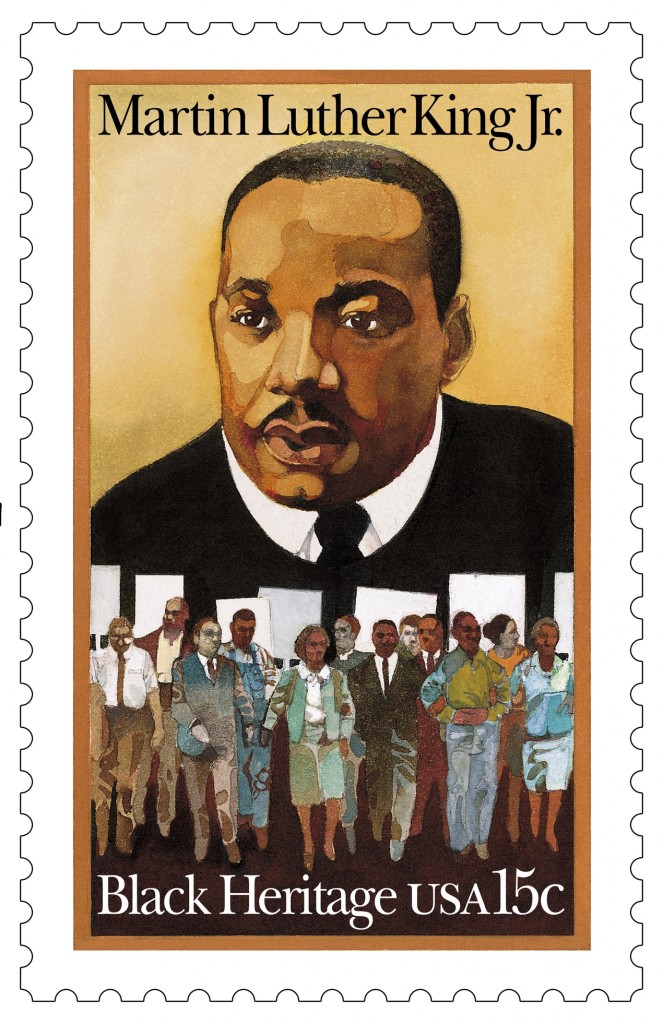
1979
The Rev. Dr. Martin Luther King Jr. (Appeared on stamps in 1979 and 1999)
The Rev. Dr. Martin Luther King Jr. (1929–1968) was a minister and humanitarian who led the Civil Rights movement. He spearheaded mass action through marches, sit-ins, boycotts, and nonviolent demonstrations that affected America’s attitudes toward racial prejudice and discrimination. He was the first African American honored as Time magazine’s Man of the Year and was awarded the Nobel Peace Prize.
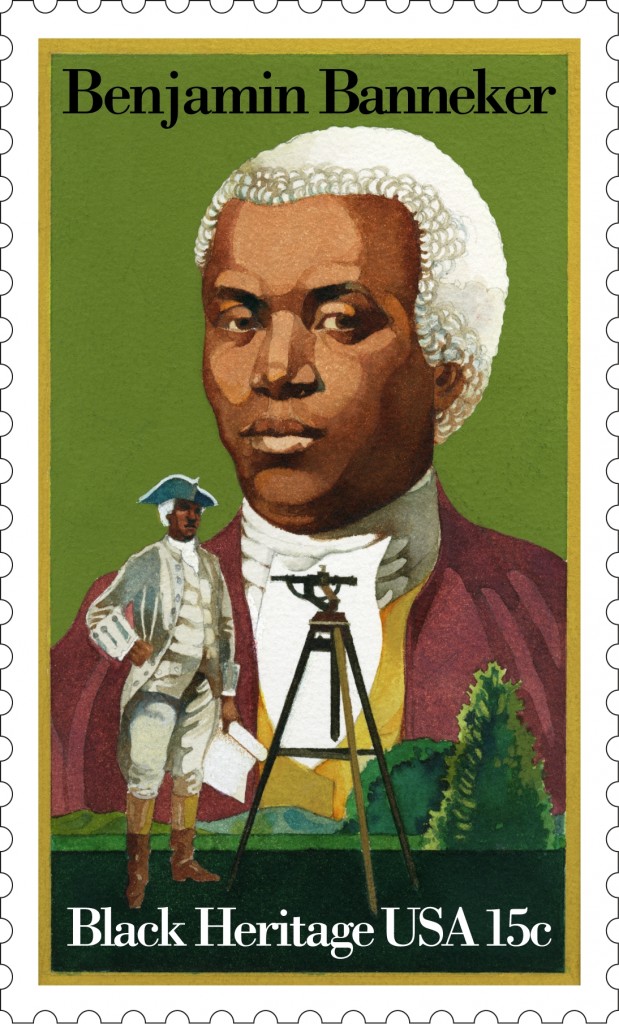
1980
Benjamin Banneker
Benjamin Banneker (1731–1806) was a free African American self-taught in the fields of mathematics and astronomy. He was probably the most accomplished black person in colonial America. He constructed the first wooden striking clock made in America. He published farmer’s almanacs. And he helped design and survey the city of Washington, D.C.
1981
Dr. Charles Drew
Dr. Charles Drew (1904–1950) was an eminent physician and surgeon whose groundbreaking research on blood transfusions has helped save millions of lives. His system of processing and storing large amounts of plasma is still used today.
Whitney Moore Young Jr.
Civil Rights leader Whitney Moore Young Jr. (1921–1971) served as executive director of the National Urban League for 10 years. He spent most of his career working to end employment discrimination in the U.S.
1982
Ralph Bunche
Ralph Bunche (1903–1971) was a renowned diplomat who oversaw the negotiations that helped resolve the bitter Arab-Israeli conflict in the 1940s. For his efforts, he was awarded the 1950 Nobel Peace Prize—the first African American to receive the honor. He played a key role in the formation and administration of the United Nations, serving as undersecretary-general in 1968.
Jackie Robinson (appeared on stamps in 1982 and 2000)
Jackie Robinson (1919–1972) broke the Major League Baseball (MLB) color barrier when he joined the once-segregated league in 1947. Though he was a renowned baseball star, he was very active in the Civil Rights movement, working with the National Association for the Advancement of Colored People (NAACP) and on several political campaigns to help break barriers for all people, not just athletes.
1983
Scott Joplin
Scott Joplin (c. 1867–1917) is known as the “King of Ragtime,” a music genre known for combining African American harmonies and rhythms with other musical styles. In 1899, pianist Joplin composed “Maple Leaf Rag,” which was the genre’s biggest hit. Almost 60 years after his death, Joplin was awarded a special posthumous Pulitzer Prize for his contributions to music.
1984
Roberto Clemente (appeared on stamps in 1984 and 2000)
Proud of his African American and Puerto Rican roots, Roberto Clemente (1834–1972) used his upbringing to help him to weather the storms of racial prejudice that plagued his early baseball career. He played 18 seasons in Major League Baseball and was first Caribbean Hispanic to be inducted into the National Baseball Hall of Fame. Clemente was more than just a baseball great, though: he was renowned for his humanitarian work in the U.S. and abroad.
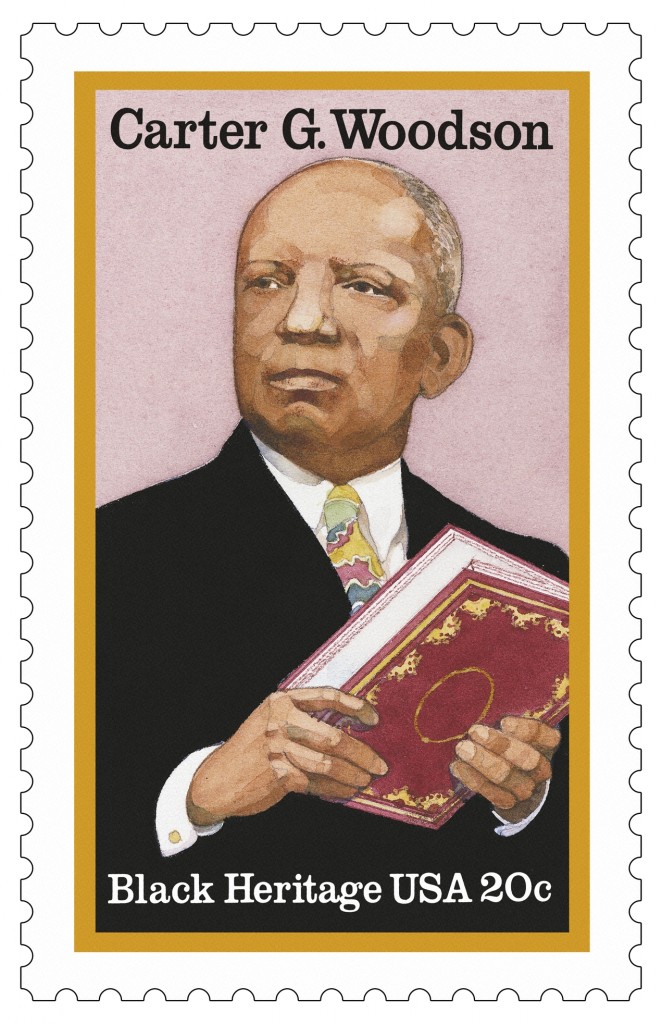
Carter G. Woodson
Educator, historian, writer, and publisher Carter G. Woodson (1875–1950) was one of the first scholars to study African American history. In an effort to promote further study of African Americans, he founded the Association for the Study of African-American Life and History. He also started the observance of Negro History Week, which has expanded to the celebration of Black History Month.
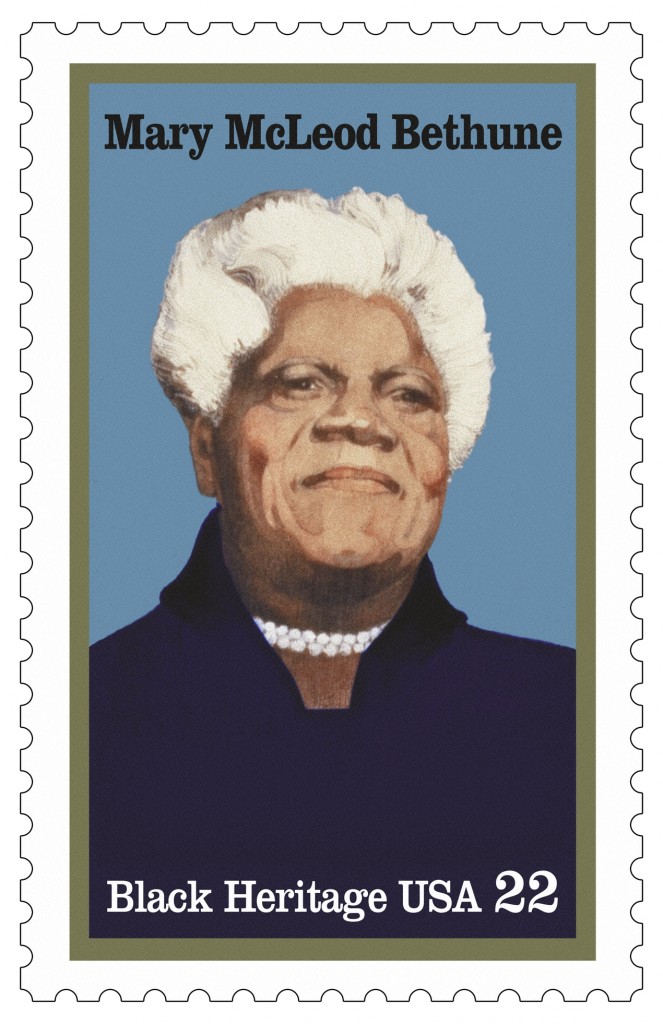
1985
Mary McLeod Bethune
The name Mary McLeod Bethune (1875–1955) is synonymous with the word education. This stateswoman, philanthropist, humanitarian, and Civil Rights activist dedicated her life to ensuring that African Americans could obtain a high-quality education that would help them improve their lives. She founded the National Council of Negro Women and the Daytona Educational and Industrial Training School in Daytona Beach, Fla.—an institution that has stood the test of time and is now known as Bethune-Cookman University.
1986
Duke Ellington
Edward “Duke” Ellington (1889–1974) is considered one of the greatest composers and orchestra conductors of the 20th century. During his 50-plus-year career, he led his band with an eloquence that helped elevate jazz as an art form. Some of his most famous compositions: “Mood Indigo,” “Take the ‘A’ Train,” “Satin Doll.”
Matthew Henson
Matthew Henson (1866–1955), the first African American Arctic explorer, was the most trusted man on Admiral Robert Peary’s expedition that discovered the North Pole in 1906.
Sojourner Truth
Born Isabella Baumfree, slave-born Sojourner Truth (c. 1797–1883) was an African American abolitionist and women’s rights activist whose speeches against slavery and for women’s suffrage drew large crowds. During the Civil War, she helped recruit black troops for the Union Army. And she worked with the National Freedmen’s Relief Association to advise former slaves as they started new lives after the war.
1987
Jean Baptiste Point Du Sable
Pioneer and entrepreneur Jean Baptiste Pointe Du Sable (c. 1750–1818) is acknowledged as the first resident of the area that would become the city of Chicago, Ill. In 1779, this man of African descent established the first permanent trading post at the mouth of the Chicago River, where he honed his skills and made a living as a merchant, fur trader, farmer, and businessman.
1988
James Weldon Johnson
James Weldon Johnson (1871–1938) authored the African American National Anthem, “Lift Every Voice and Sing.” The noted writer, lawyer, educator, and Civil Rights activist was a leading poet, editor, and mentor during the Harlem Renaissance. Johnson also was the first African American to serve as National Association for the Advancement of Colored People (NAACP) executive secretary, a post he held for 10 years (1920 to 1930), and the first African American professor hired at New York University.
1989
- Philip Randolph
For more than 60 years, A. Philip Randolph (1889–1979) was a tireless champion of equal rights and equal opportunity as a leader in the Civil Rights movement, the American labor movement, and the socialist political party. He organized and led the Brotherhood of Sleeping Car Porters, achieving the first union contract signed by a white employer and an African American labor union. He also was a key organizer of the historic 1963 March on Washington for Jobs and Freedom.
1990
Jesse Owens (appeared on stamps in 1990 and 1998)
James “Jesse” Cleveland Owens (1913–1980) stunned the world at the 1936 Olympic Games in Berlin, Germany, when he capturing four gold medals in track and field. He was the most successful athlete at the games, shattering Olympic records—and Nazi leader Adolf well as Hitler’s false theories of racial superiority.
Ida B. Wells
Ida B. Wells-Barnett (1862–1931) devoted her life to educating people about the horrors of discrimination against African Americans and women. Much of her journalism career centered on the antilynching crusade and voting rights for women. She was a founder of the National Association for the Advancement of Colored People (NAACP), as well as the first suffrage club for African American women.
1991
Jan E. Matzeliger
Jan Ernst Matzeliger (1852–1889) revolutionized the shoe-making industry with his invention of the shoe lasting machine, which was able to duplicate and automate the previously slow, intricate process of joining the upper part of a shoe to the sole. In the same time an expert shoe laster could produce 50 pairs of shoes, Matzeliger’s machine could produce up to 700 pairs.
1992
W.E.B. Du Bois (appeared on stamps in 1992 and 1998)
William Edward Burghardt (W.E.B.) Du Bois (1868–1963) was a critic, editor, scholar, author, Civil Rights leader—and one of the most influential African Americans of the 19th and 20th centuries. His trailblazing approach to studying social systems and phenomena earned him the moniker “The Father of Social Science.” Du Bois was a founder of the National Association for the Advancement of Colored People (NAACP), and he served for 25 years as the editor-in-chief of the group’s Crisis magazine.
1993
Percy Lavon Julian
African American chemist Percy Lavon Julian (1899–1975) was a pioneer in the chemical synthesis of medicinal drugs from plants. He synthesized cortisone for arthritis, a drug for glaucoma, and the hormone progesterone. Julian, who earned more than 130 chemical patents, was the first African American chemist inducted into the National Academy of Sciences.
Joe Louis
The “Brown Bomber,” Joseph Louis Barrow (1914–1981) won the world heavyweight boxing title in 1937 and held it until he retired in 1949. Considered one of the greatest heavyweight champions of all time, Louis considered a national hero, particularly after defeating German Max Schmeling in a fight that came to symbolize the struggle between democracy and freedom in the World War II era.
Clyde McPhatter
As the original lead singer of the Drifters, Clyde McPhatter (1932–1972) brought gospel-style vocals to popular music. He was one of the most widely imitated rhythm and blues (R&B) singer of the 1950s and 1960s, and a key figure in the styles of doo-wop and R&B.
Otis Redding
Otis Redding (1941–1967) is considered one of the greatest singers in the history of American popular music, as well as one of the most respected and influential soul and rhythm and blues artists. Initially popular mainly with African Americans, Redding later reached a wider American pop music audience. Among his best-known songs: “(Sittin’ on) The Dock of the Bay,” “Respect,” and “Try a Little Tenderness.”
Dinah Washington
Born Ruth Jones in Tuscaloosa, Ala., Dinah Washington (1924–1963) was a singer and pianist became one of America’s most popular and versatile performers in the 1950s. Primarily a jazz vocalist, she gave herself the title of “Queen of the Blues.” Her signature song, “What a Difference a Day Makes,” won the 1959 Grammy Award for Best Rhythm and Blues Performance.
1994
“Howlin’ Wolf”
“Howlin’ Wolf (1910–1976),” born Chester Arthur Burnett in White Station, Miss., left the South for Chicago, Ill., and became one of the best known blues artists in the Windy City and beyond. His instruments of choice: his booming voice, as well as the guitar and harmonica.
Jim Beckwourth
James P. “Jim” Beckwourth (1798–1866) was an African American frontiersman. Born a slave in Virginia, he later moved out West and earned his living as a miner, guide, fur trapper, company agent, army scout, soldier, and hunter. In the early 1850s, he discovered a pass through the Sierra Nevada Mountains to the Sacramento Valley, opening a clear pathway to California.
Nat King Cole
Alabama-born Nat King Cole (1919–1965) started his career as a jazz pianist and went on to become one of the most popular vocalists of all time. With his soft, baritone voice, Cole entertained audiences around the world via his recordings and The Nat King Cole Show—one of the first U.S. television variety shows hosted by an African American.
Dr. Allison Davis
Anthropologist and educator Dr. William Boyd Allison Davis (1902–1983) was renowned as a writer, researcher, and scholar who became the first African American to hold a full faculty position at a major white institution, the University of Chicago. He would go on to serve in the administrations of Presidents Lyndon B. Johnson and Richard M. Nixon as a member of the President’s Commission on Civil Rights and as the vice chairman of the Department of Labor’s Commission on Manpower Retraining.
Billie Holiday
Born Eleanora Fagan, Billie Holiday (1915–1959) was one of the most influential jazz singers of all time. Known as “Lady Day,” this tragic songstress used her voice as an instrument, manipulating phrasing and tempo to convey a broad range of feelings with a powerful emotional intensity. Despite her limited range and lack of formal training, Holiday developed skills that captivated audiences.
Robert Johnson
Despite his short life and limited recording history—he recorded only 29 songs before he died at age 27—Robert Leroy Johnson (1911–1938) had a unique guitar style that has influenced musicians since the 1930s. Legend has it that Johnson made a deal with the devil in order to become a great jazz musician—and today Johnson is a member of both the Blues Hall of Fame and the Rock & Roll Hall of Fame.
“Muddy Waters”
Born McKinley Morganfield in Mississippi, “Muddy Waters” (1913–1983) is often called “The Father of Modern Chicago Blues.” His flair for transforming traditional Delta blues into electric blues helped him become a huge success throughout the U.S. and around the world.
Bill Pickett
William M. “Bill” Pickett (1870–1932) was a cowboy, rodeo, and Wild West show performer who invented the cowboy sport of steer wrestling, also called “bulldogging.” He and his horse Spradley became a box-office draw in rodeos in the U.S. and abroad.
“Ma Rainey”
Born Gertrude Malissa Nix Pridgett, “Ma” Rainey (1886–1939) was called the “Mother of the Blues.” She specialized in a down-home style of classic blues, and her fame grew simultaneously with the spread of the blues genre.
Jimmy Rushing
James “Jimmy” Andrew Rushing (1901–1972) was linked with famed bandleaders, such as Benny Goodman, Count Basie, Walter Page, and Buck Clayton. Throughout his career, Rushing established himself as one of the greatest singers of both jazz and the blues.
Bessie Smith
Nicknamed “The Empress of the Blues,” Bessie Smith (1854–1937) was regarded as one of the greatest singers of her era. She made more than 100 recordings, both of blues and popular songs, paving the way for future blues singers and jazz musicians.
Ethel Waters
Ethel Waters (1896–1977) showcased her musical creativity and dramatic expression as a singer, dancer, and actress. During her long career, she achieved prominence and critical acclaim on the stage and on the big screen.
1995
Louis Armstrong
Lois Armstrong (1901–1971) was one of the world’s most influential jazz musicians. Even before he was a teenager, he learned to play the trumpet and the cornet, and expanded his repertoire through singing and acting. Throughout his five-decade-long career, Armstrong regaled audiences with his inventive musical style and scat singing.
Eubie Blake
James Hubert “Eubie” Blake (1887–1983) was a renowned composer, lyricist and pianist composer of ragtime and jazz music. Along with his bandleader and partner, Noble Sissle, Blake became a successful songwriter in the 1920s. The team wrote the hit Broadway show “Shuffle Along,” one of the first Broadway musicals to be written and directed by African Americans.
Bessie Coleman
Bessie Coleman (1892–1926) was the first person of African American and Native American descent to hold an international pilot’s license. Denied entry into U.S. flight schools, Coleman traveled to Paris, France, to earn her wings. When “Queen Bess,” as she was known, returned to the United States, she became a stunt flyer.
John Coltrane
John Coltrane (1926–1967), a saxophonist and composer, is considered one of the leading jazz artists of the 1950s and 1960s. He performed with renowned musicians of the time and was at the forefront of the improvisation-heavy free jazz style.
Errol Garner
Jazz pianist Erroll Garner (1921–1977) began playing piano at the age of three, and went on to compose more than 200 works without ever learning to read music. He is considered a major jazz innovator, especially for his approach to melody, harmony, and rhythm. His best-known song is “Misty.”
Coleman Hawkins
Coleman Hawkins (1904–1969) was one of the leading musicians in the swing and big band eras, and also helped develop the bebop style of jazz. He is known as one of the first prominent saxophone players.
James P. Johnson
James Price Johnson (1894–1955) was a pianist and composer. Known as the “Father of Stride Piano,” his most well-known composition is “The Charleston”—perhaps the most famous musical piece to come out of the Roaring Twenties. His style influenced music greats like Duke Ellington and Count Basie.
“Jelly Roll Morton”
Born Ferdinand Joseph La Menthe, “Jelly Roll Morton” (1890–1941) was an American ragtime and early jazz pianist, bandleader and composer who started his career in New Orleans, La. He was best known for his skills as an arranger, proving that the highly improvisational genre could maintain its characteristics even when notated.
Charles Mingus
Charles Mingus (1922–1979) was a notable 20th century musician. This talented bass player, pianist, composer, and bandleader toured with some of the famous big bands of the 1940s, accompanied many pioneering jazz musicians, and led diverse ensembles. He also created his own recording and publishing companies.
Thelonious Monk
A brilliantly unorthodox pianist and composer, Thelonious Monk (1917–1982) was studied by musicians years before he was accepted by the public. His most famous composition is “’Round Midnight.”
Charlie Parker
Born Charles Christopher Parker Jr., Charlie Parker (1920–1955) was an innovative composer and jazz saxophonist. Known as “Yardbird” or “Bird,” he was a highly influential jazz soloist and a leading figure in the development of the bebop style of jazz.
1996
Count Basie
Born William James Basie (1904–1984), “The Count” was a renowned jazz pianist, bandleader, and composer whose band included some of the greatest musicians of all time. His sound ushered in the swing era of jazz the late 1930s and 1940s.
John Henry
John Henry is an African American folk hero who symbolizes strength and determination. His story is told in folk songs, and has been the subject of several stories, plays, books, and novels. John Henry is often portrayed as a “steel-driving man” whose strength rivaled that of mechanical drills. In one story, John Henry accepted the challenge of trying to outperform a steam-powered drill. Swinging a heavy hammer in each hand, he beat the machine but died soon after—some say from exhaustion, others say from a broken heart when he realized that machines would one day replace muscle and spirit.
Ernest E. Just
Marine biologist Ernest E. Just (1883–1941) was the first African American to receive worldwide acclaim as a scientist. He pioneered experiments in the fertilization of marine invertebrates and studied the fundamental role of the cell surface in the development of organisms.
1997
Benjamin O. Davis Sr.
Benjamin O. Davis Sr. (1877–1970) was the first African American general in the U.S. Army. He distinguished himself in a long military career—serving in the Spanish-American War, the Philippine-American War, and World War I, and World War II—and was a driving force behind the eventual integration of the U.S. armed forces.
1998
Mahalia Jackson
Known as the “Queen of Gospel Music,” Mahalia Jackson (1911–1972) was one of the world’s most influential gospel singers. Her powerful contralto voice was a key instrument in the Civil Rights movement, as she was a featured singer during rallies, including the momentous 1963 March on Washington for Jobs and Freedom.
“Lead Belly”
Born Huddie William Ledbetter, “Lead Belly” (1888–1949) was blues musician renowned for his vocal prowess and skill on the 12-string guitar. His music spanned a broad range of topics, and he was well known for his political protest songs in the 1930s, when he participated in the trade union movement.
Roberta Martin
Roberta Martin (1907–1969) was a renowned gospel composer, singer, pianist, arranger, and choral director whose talent inspired artists like Albertina Walker and James Cleveland. Her group, the Roberta Martin Singers, set the standard for gospel singers and had a successful recording career. Martin also established and operated her own gospel music publishing house, the Roberta Martin Studio of Music.
Sister Rosetta Tharpe
Sister Rosetta Tharpe (1915–1973) was one of many African American gospel singers who contributed to American music. Known for her signature guitar style, she became gospel music’s first crossover artist and its first great recording star.
Madam C.J. Walker
Born Sarah Breedlove, Madam CJ Walker (1867–1919) was a beauty-products pioneer who became one of the first female millionaires in America. Her Madam C.J. Walker Manufacturing Company was one of the largest U.S. businesses owned by an African American. Walker also was a leading philanthropists and political activist, who strongly supported education, charitable institutions, political rights, and economic opportunities for African Americans and women.
Clara Ward
Gospel great Clara Ward (1924–1973) was the creative force behind the Ward Singers, often acknowledged as America’s greatest gospel group. Her song “Surely God Is Able” became one of the highest selling gospel records of all time.
Josh White
Joshua Daniel White (1914–1969) was one of the most popular and influential African American folk singers in in the mid-20th century. He recorded race records in a broad range of genres, including blues, gospel, and social protest. During his career, White sang for President D. Franklin Roosevelt at the White House in the 1940s, suffered the ill effects of McCarthyism in the 1950s, and he was a featured performer at the 1963 March on Washington.
1999
Malcom X
El-Hajj Malik El-Shabazz, known as Malcolm X (1925–1965), was one of the most influential human rights activists in American history. Born Malcolm Little in Omaha, Neb., to a Baptist preacher who followed the teachings of Pan-African activist Marcus Garvey, Malcolm X became a follower of the Hon. Elijah Muhammad’s Nation of Islam, which also adhered to Garvey’s principles of black nationalism. Malcolm became a powerful spokesman for the organization and devoted his life to ensuring justice for his fellow African Americans, as well as oppressed people across the globe.
2000
Josh Gibson
Legendary baseball player Josh Gibson (1911–1947) was one of the greatest power hitters in Negro Leagues Baseball, regularly hitting home runs for the Homestead Grays and the Pittsburgh Crawfords. He was never able to play in the Major League Baseball league: he died in 1947, a month after he turned 35 and a few months before Jackie Robinson became the first African American to play for the MLB. Gibson was inducted into the National Baseball Hall of Fame in 1972, the second Negro Leagues player (the first was Satchel Paige) to receive the honor.
Patricia Roberts Harris
Patricia Roberts Harris (1924–1985) was the first African American woman to serve as a U.S. ambassador, representing the nation’s diplomatic interests in Luxembourg. The renowned lawyer, educator, and public administrator also served as the secretary of two federal departments: the Department of Housing and Urban Development and the Department of Health and Human Services.
Satchel Paige
Leroy Robert “Satchel” Paige (1906–1982) is considered the most dominating and crowd-pleasing pitcher to play in the Negro Leagues. At the reported age of 42, he signed with Major League Baseball’s (MLB’s) Cleveland Indians. Paige was the first player who had played in the Negro Leagues to pitch in the MLB World Series.
2001
Roy Wilkins
Roy Wilkins (1901–1981) was a U.S. Civil Rights leader and activist who served as the executive director of the National Association for the Advancement of Colored People (NAACP) for 20-plus years. As a writer and spokesman for the civil rights movement, Wilkins inspired presidents and members of Congress to pay attention to the rights of African Americans.
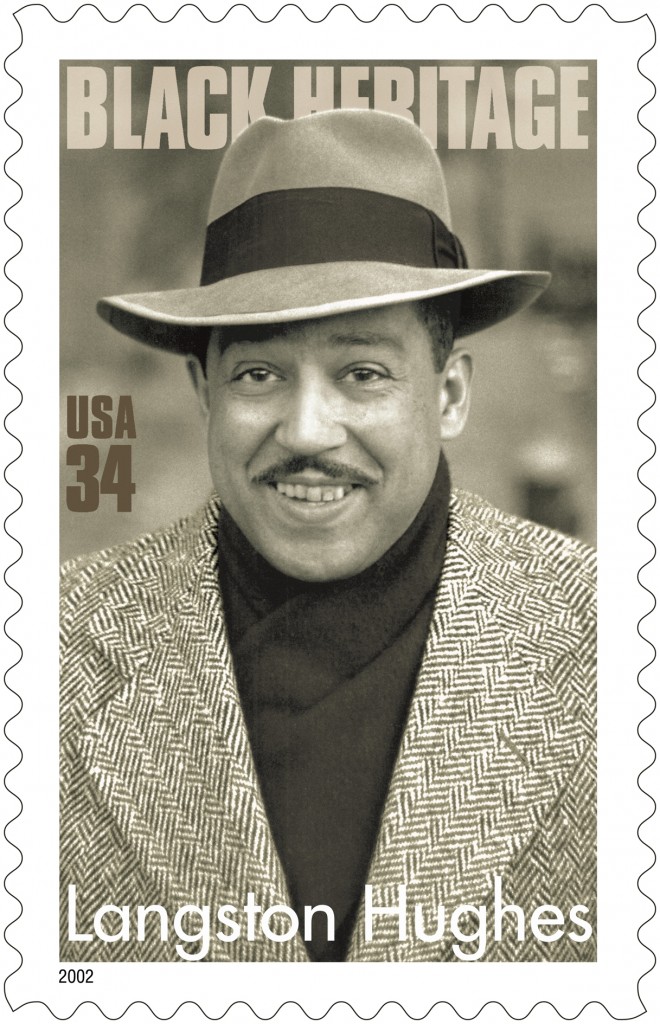
2002
Langston Hughes
Langston Hughes (1902–1967) was one of the leading voices in the Harlem Renaissance. This African-American poet, novelist, and playwright became one of the foremost interpreters of racial relations in the United States from the 1920s through the 1960s. Hughes published more than 35 books, and his influence is seen in the writings of authors from his generation to the present.
Ethel L. Payne
An internationally recognized writer and commentator, Ethel L. Payne (1911–1991) was a syndicated columnist and long-time reporter for the Chicago Defender, one of the leading African-American newspapers in the United States. She also was the first African-American woman to receive accreditation as a White House correspondent.
2003
Zora Neale Hurston
Zora Neale Hurston (1891–1960) was a writer, folklorist, and anthropologist who studied African American heritage at a time when African American culture was not a popular field of study. A central figure in the Harlem Renaissance, Hurston’s works display her skill for using metaphorical language to tell stories, as well as her interest in and celebration of Southern African American culture. Her best-known novel: “Their Eyes Were Watching God.”
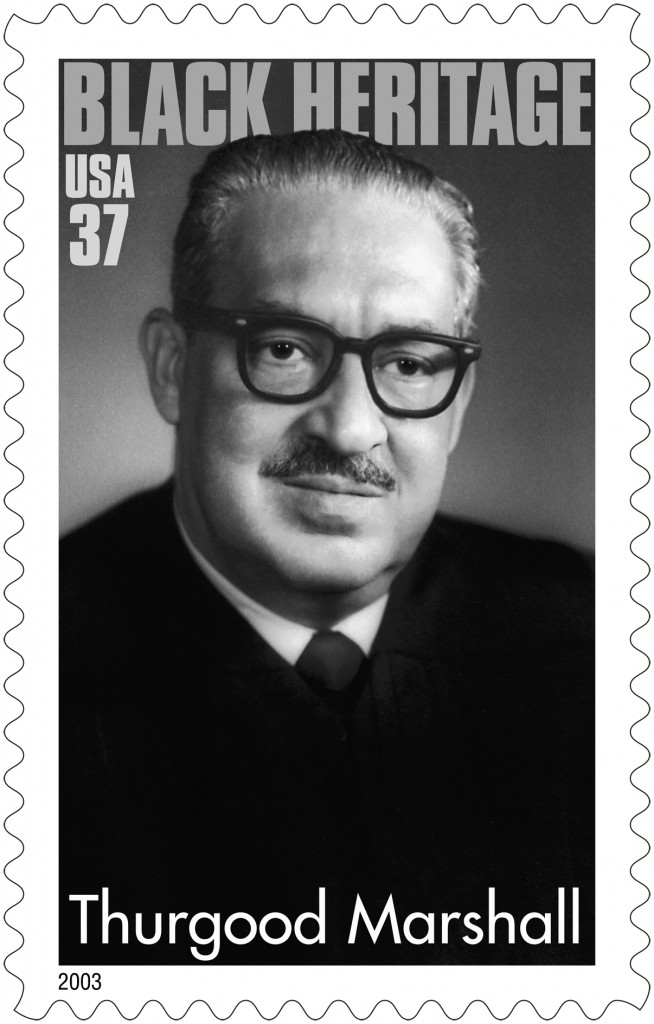
Thurgood Marshall
Thurgood Marshall (1908–1993) was the first justice to serve on the U.S. Supreme Court. His 24-year tenure was marked by his commitment to defending constitutional rights and affirmative action, as well as his strong opposition to the death penalty. Prior being seated on the highest court in the land, Marshall was a lawyer who was best known for his high success rate in arguing before the Supreme Court. particularly his victory in Brown v. Board of Education of Topeka (Kan.) case, a decision that desegregated America’s public schools.
2004
Alvin Ailey
Alvin Ailey (1938–1989) was a pioneering modern dance choreographer who popularized modern dance and inspired leagues of African Americans to participate in the art. He founded the famed Alvin Ailey American Dance Theater in 1958—and more than 50 years later, the troupe continues to enthrall audiences across the globe.
James Baldwin
James Baldwin (1924–1987) is a renowned novelist, essayist, playwright, and poet who used his art to address complex themes and highlight the psychological issues related to discrimination. Among his best known works are the book-length essay “The Fire Next Time,” the novel “Go Tell It on the Mountain,” and the play “The Amen Corner.”
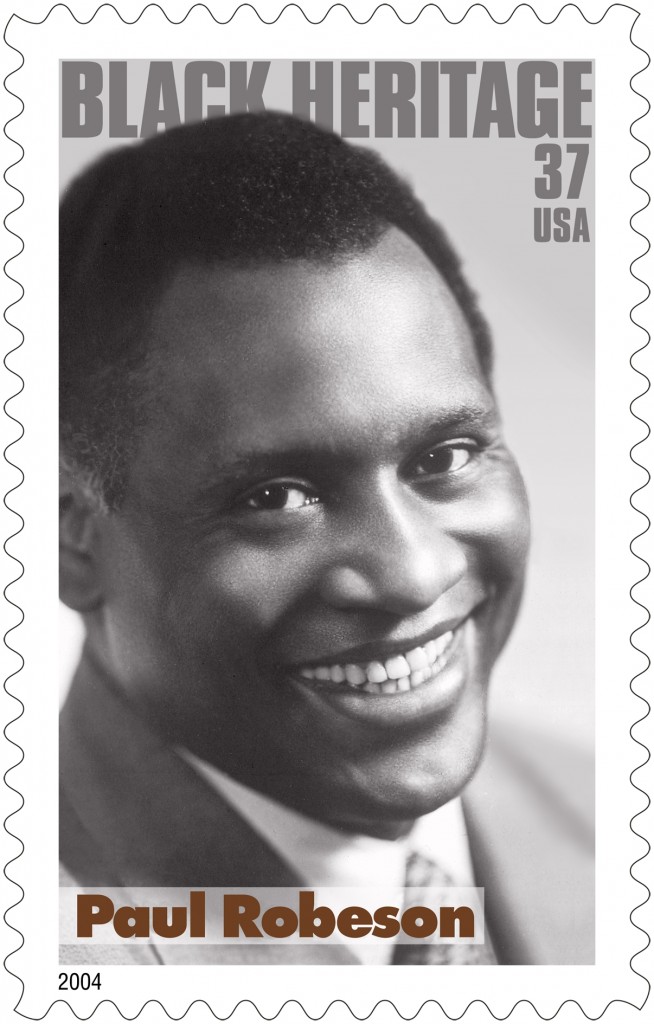
Paul Robeson
Paul Robeson (1898–1976) was the epitome of a 20th century Renaissance man. This All-American football player was valedictorian of his undergraduate class at Rutgers University and later earned a law degree from Columbia University. To these achievements he added a stellar singing and acting career that earned him international accolades, particularly for his renditions of black spirituals and his stage role in the play “Othello.” Throughout his life, Robeson was very outspoken on behalf of racial justice, social progress, and international peace.
Wilma Rudolph
Wilma Rudolph (1940–1994) was the first American woman to win three gold medals in track and field during a single Olympic Games. As a track and field champion, she elevated the presence of women’s track in the U.S. As an African American, she fought for Civil Rights and served in several government programs designed to help underprivileged youth.
2005
Arthur Ashe
Arthur Robert Ashe Jr. (1943–993) was the only African American man ever to win the singles title at the Wimbledon tennis tournament. During his career, he won three Grand Slam titles, ranking him among the best tennis players from the U.S. After contracting human immunodeficiency virus (HIV) from a blood transfusion, he worked diligently to educate others about HIV and acquired immune deficiency syndrome (AIDS).
Marian Anderson
Marian Anderson (1897–1993) was one of the most celebrated singers of the 20th century. Her repertoire included a broad range of styles, including concert literature, opera, and traditional American songs and spirituals. Anderson was an important figure in the struggle for African American artists to overcome racial prejudice in the U.S. She performed a critically acclaimed open-air concert on the steps of the Lincoln Memorial in Washington, D.C., and also was the first black person, American or otherwise, to perform at New York City’s Metropolitan Opera.
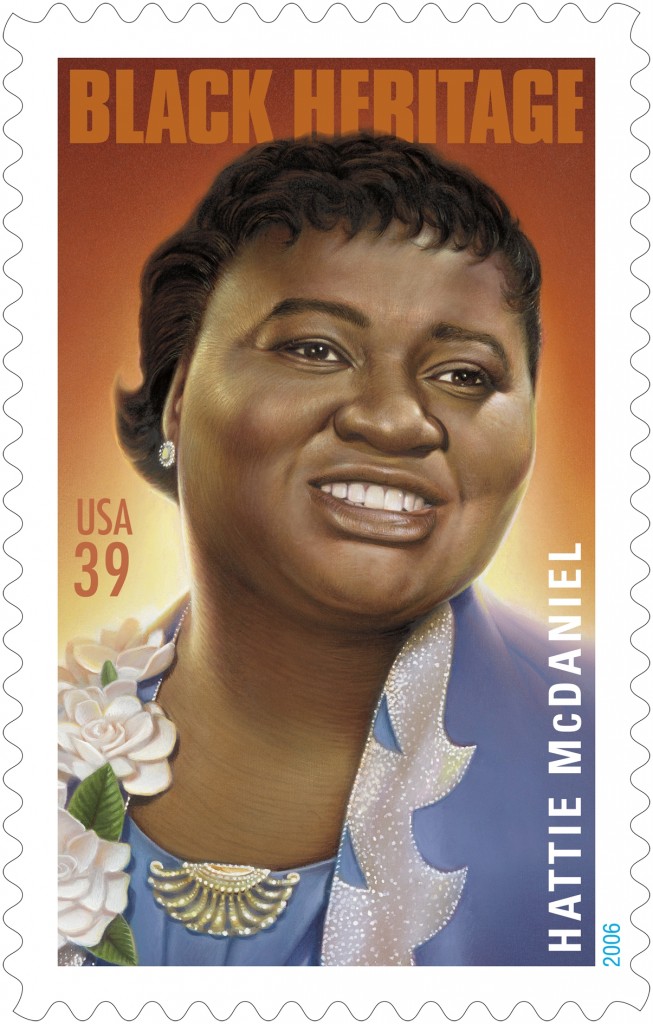
2006
Hattie McDaniel
Hattie McDaniel (1895–1952) was an actress, singer-songwriter, and comedienne. Best known for her role in the film “Gone with the Wind,” she was the first African American to win an Academy Award when she was named Best Supporting Actress in 1939.
Sugar Ray Robinson
Sugar Ray Robinson (1921–1989), born Walker Smith Jr. is frequently called the best pound-for-pound boxer. He was the first boxer in history to win a divisional world championship five times.
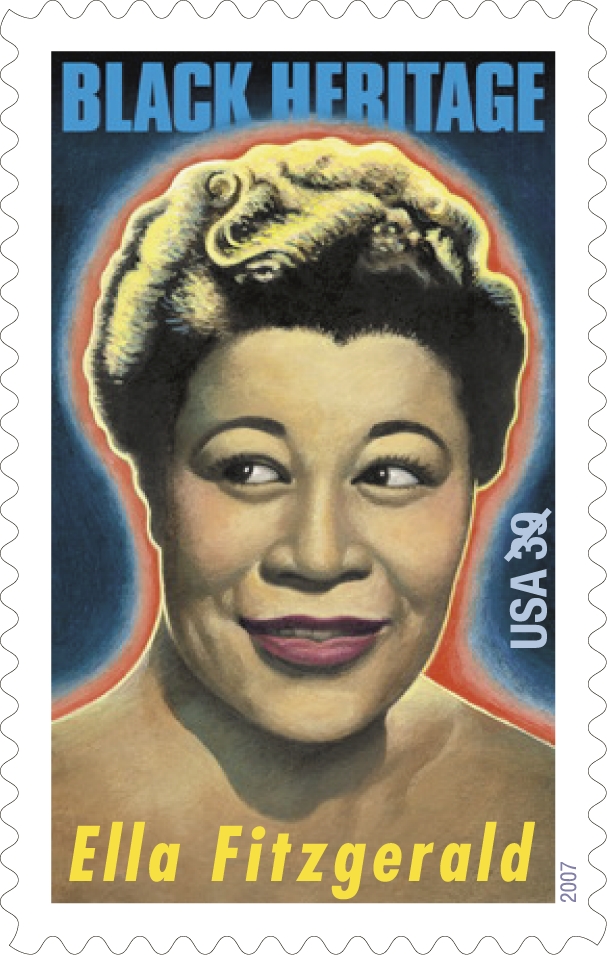
2007
Ella Fitzgerald
Ella Jane Fitzgerald (1917–1996) was the most popular female jazz singer in the U.S. for more than half a century. In her lifetime, she won 13 Grammy awards and sold more than 40 million albums. While Fitzgerald often appeared in movies and television, she is most noted for her musical collaborations with jazz greats like Louis Armstrong and Duke Ellington.
2008
Charles W. Chesnutt
Charles Waddell Chesnutt (1858–1932) is best known for his novels and short stories exploring complex issues of racial and social identity in the post-Civil War South. Two of his books were adapted as silent films by African American director and producer Oscar Micheaux.
2009
Anna Julia Cooper
Anna Julia Haywood Cooper (1858–1964) was one of the most prominent African American scholars in the U.S. Upon receiving her PhD in history from the University of Paris-Sorbonne, she became the fourth African American woman to earn a doctoral degree.
Richard Wright
Author Richard Nathaniel Wright (1908–1960) focused on racial themes, especially those involving the plight of African Americans during the late 19th to mid-20th centuries, throughout his literary works. Critics say his novels, short stories, and poems helped change race relations in the U.S.
2010
Oscar Micheaux
Oscar Devereaux Micheaux (1884–1951) is regarded as the first major African American feature filmmaker, the most successful African American filmmaker of the first half of the 20th century, and the most prominent producer of race films. His films, which often featured contemporary black life and dealt with interactions between blacks and whites, were used to oppose racial injustice.
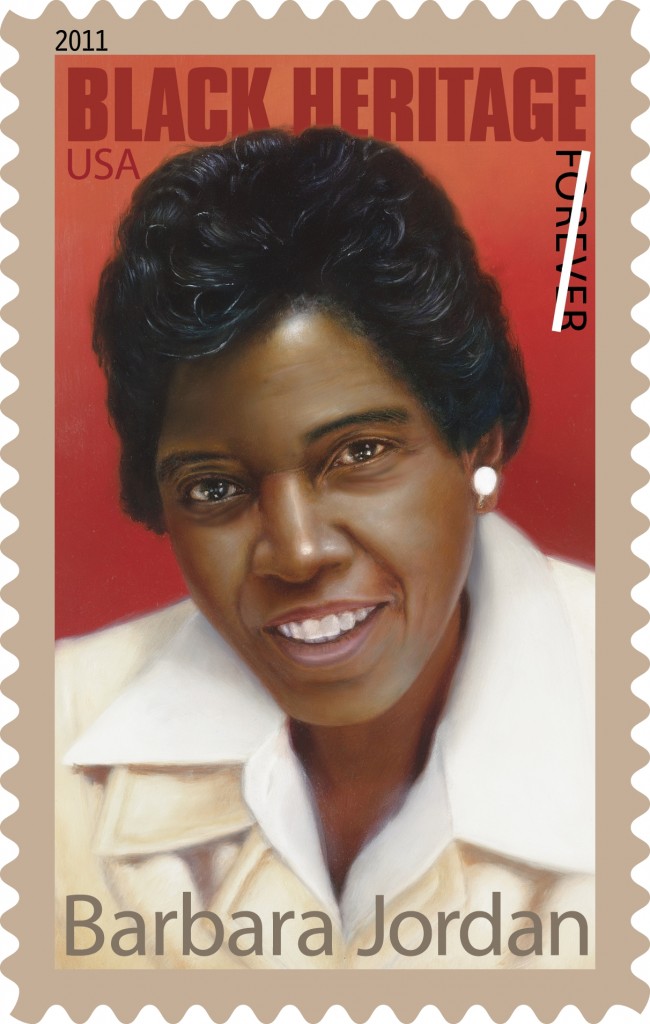
2011
Barbara Jordan
Barbara Charline Jordan (1936–1996) was the first African American elected to the Texas Senate after Reconstruction, the first Southern black female elected to the U.S. House of Representatives, and the first African-American woman to deliver a keynote address at a Democratic National Convention.
2012
Miles Davis
Miles Dewey Davis III (1926–1991) is considered one of the most influential and innovative musicians of the 20th century. Together with his musical groups, Davis was at the forefront of several major developments in jazz.
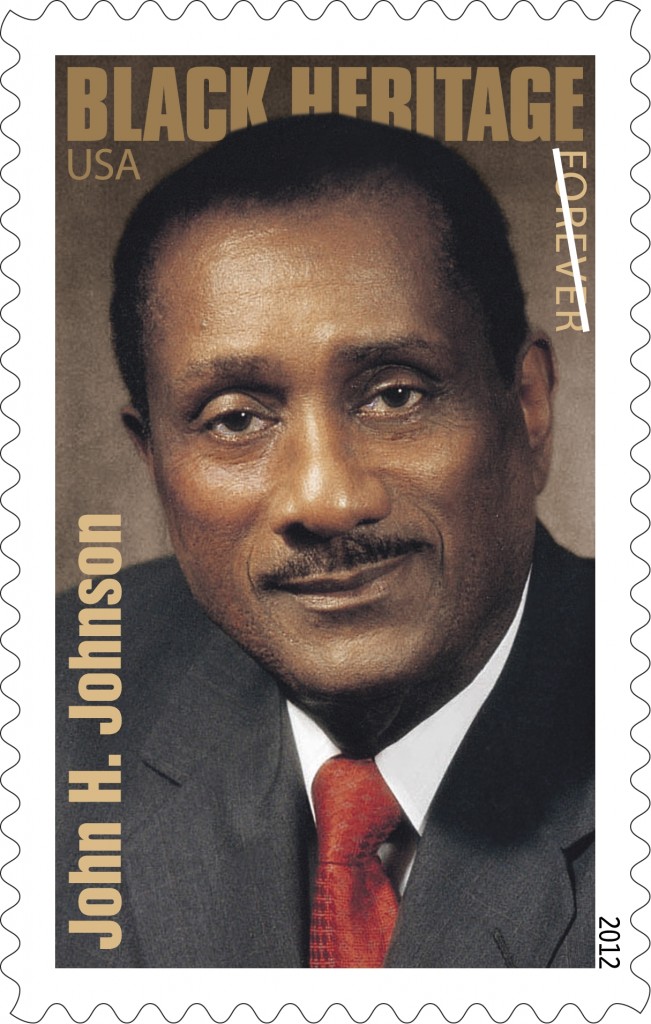
John H. Johnson
John Harold Johnson (1918–2005) founded the Johnson Publishing Company, which produced beloved African American publications like Ebony and Jet. He was the first African American to appear on the Forbes 400 list.
2013
Ray Charles
Raymond Charles Robinson (1930–2004), professionally known as Ray Charles, was an American singer, songwriter, musician, and composer. Despite being blind since age seven, he pioneered the genre of soul music during the 1950s by combining rhythm and blues, gospel, and blues styles into his music. Charles is number 10 on Rolling Stone magazine’s list of “100 Greatest Artists of All Time.”
Althea Gibson
Althea Gibson (1927–2003) the first African American athlete to cross the color line of international tennis, besting her competition in some of the sport’s biggest events, including Wimbledon and U.S. Nationals (precursor of the U.S. Open). She also was the first black player to compete on the women’s professional golf tour.
2014
- Alfred “Chief” Anderson
Charles Alfred Anderson Sr. (1907–1996), known as the “The Father of Black Aviation,” was the chief flight instructor for the famed Tuskegee Airmen. He also has been referred to as the “Charles Lindbergh of Black Aviation” for his record-breaking flights that inspired other African-Americans to become pilots.
Wilt Chamberlain
Wilton Norman “Wilt” Chamberlain (1936–1999) was a National Basketball Association phenom. The 7-foot-1-inch Chamberlain is considered one of the greatest and most dominant players in NBA history.
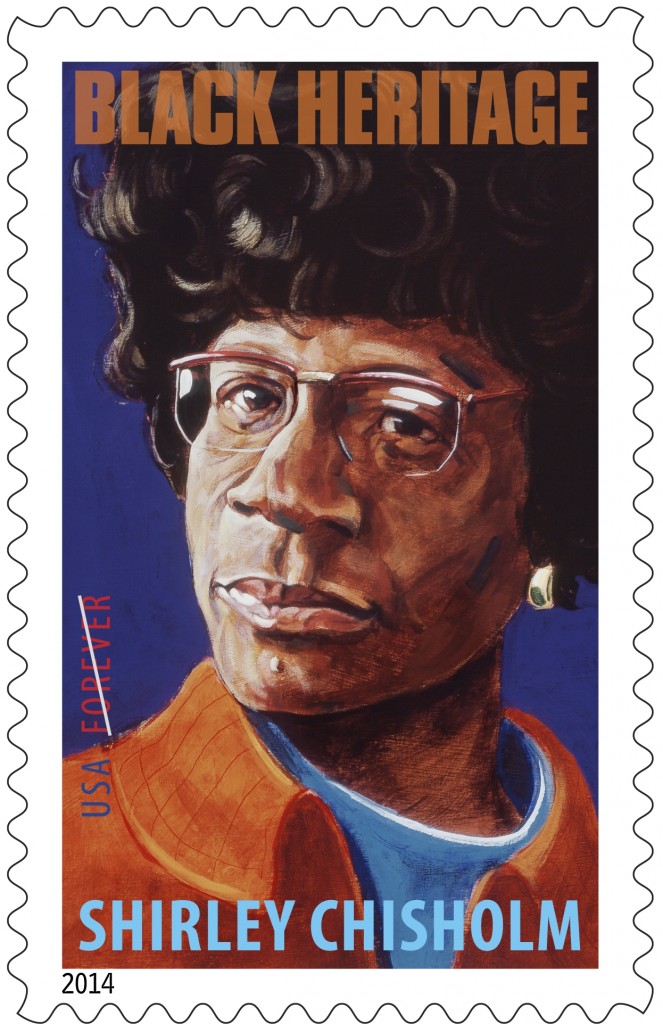
Shirley Chisolm
Shirley Anita St. Hill Chisholm (1924–2005) was the first African American woman elected to the U.S. She was the first major-party black candidate for President of the United States and the first woman to seek the Democratic Party’s presidential nomination.
Ralph Ellison
Writer and scholar Ralph Waldo Ellison (1913–1994) is best known for his first novel, “Invisible Man,” which is considered by many to be a seminal work on marginalization from an African American protagonist’s perspective.
Jimi Hendrix
James Marshall “Jimi” Hendrix (1942–1970) was an innovative rock guitarist, singer, and songwriter. His mainstream career spanned only four years, but he is widely regarded as one of the most influential electric guitarists in the history of popular music—and one of the most celebrated musicians of the 20th century.
2015
Robert Robinson Taylor
Robert Robinson Taylor (1868–1942) was the first accredited African American architect. The first black student enrolled at the venerable Massachusetts Institute of Technology (MIT), Taylor designed many of the buildings on the campus of Tuskegee University and he served as second-in-command to the school’s founder and president, Booker T. Washington.
Maya Angelou
Author, poet, actress, and Civil Rights champion Dr. Maya Angelou (1928–2014) was one of the most dynamic voices in 20th century American literature. Her book “I Know Why the Caged Bird Sings,” an autobiographical account of her childhood, gained wide acclaim for its vivid depiction of African American life in the South.
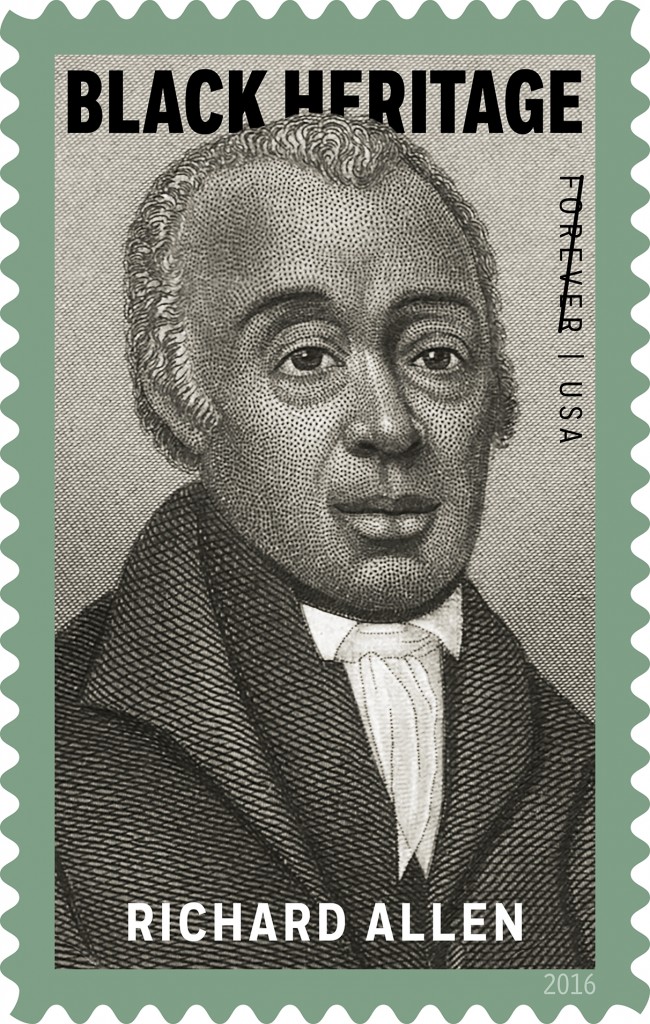
2016
Richard Allen
Bishop Richard Allen (1760–1831) was an activist and writer who founded the African American Episcopal (AME) church, the first independent black denomination in the U.S. He worked to upgrade the social status of the black community, established programs to increase literacy among African Americans, and promoted national organizations to develop political strategies.
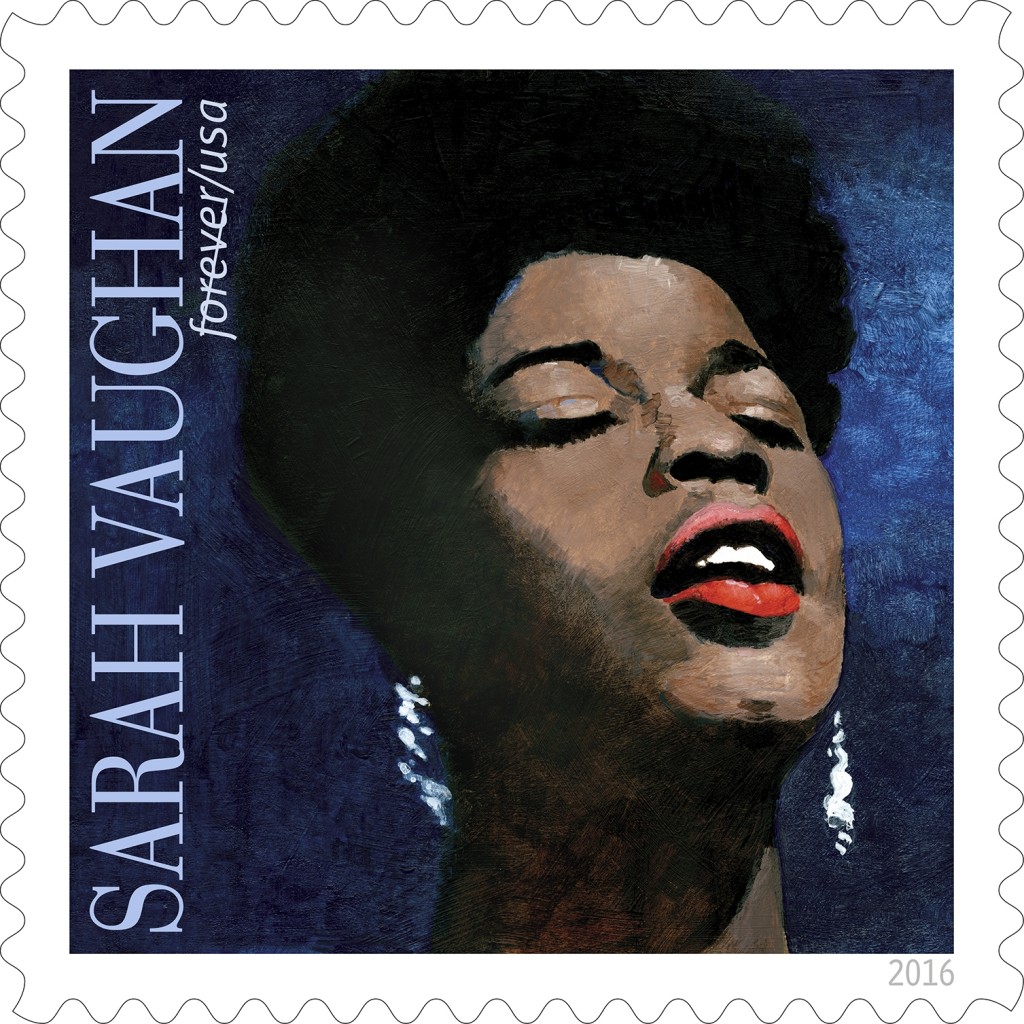
Sarah Vaughan
Sarah Vaughan (1924–1990) was one of America’s greatest singers, successful in both jazz and pop, with a talent for improvisation and skillful phrasing and a voice that ranged over several octaves. Nicknamed “The Divine One’” Vaughan is a Grammy Award Hall of Fame inductee.
Sources: U.S. Postal Service (http://uspsstamps.com, http://about.usps.com/publications/pub354/welcome.htm, https://about.usps.com/news/national-releases/2015/pr15_069.htm) Black Enterprise (http://www.blackenterprise.com/functional/first-african-americans-on-american-stamp/2/)

